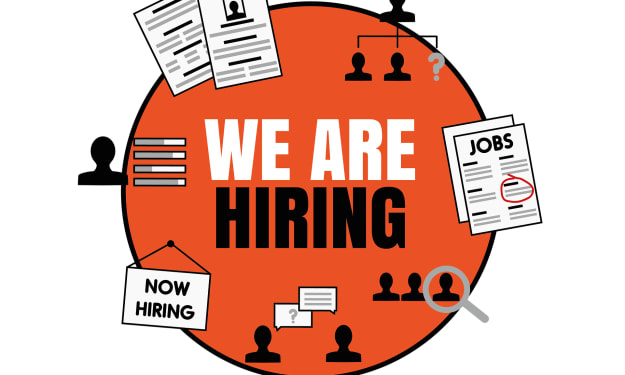I Can Tell You My Secret Now
It's okay to not be okay

Note: This piece is about mental health awareness and the struggle many people face every single day. It is not meant as a diagnostic tool or to give any medical advice whatsoever. Every individual has their own story and their own treatment plan, so even if you see part of yourself in this piece, it's vital that you seek the help of a trained professional. It IS okay not to be okay.
Anxiety by Josephine Matson is the preceding topic to this post.
______________________________________________
It could have been my turning point.
I'm at a restaurant with coworkers. We've been preparing for a meeting all day and tomorrow starts three all-day meetings that we will facilitate. All day they've been talking about the special beef soup at this place, and that's what we ordered along with bread and appetizers.
I've had my soup, bread, and some of the finger foods. I drink two large glasses of water and head off to the ladies room. A few minutes later I return to the table.
My co-worker, my friend, turns to me and hands me an icy glass of water, whispering "You don't have to do that, you know."
My face, which was flushed and damp turns even redder as I take the water and answer "I don't know what you mean. Everyone needs to use the restroom now and then.", and then I take a long drink of that cool water. It feels good on my inflamed throat.
She just smiles, shaking her head, then whispering "I know what you are doing."
Oh no. No. And not here. Not now. I'm away from home and I need to be professional and cool for the next four days. I have no idea what mayhem I will face when I get home, and it's not fair. This is supposed to be my happy spot. These are more than coworkers. These are my friends. So I do what any adult would do. I lie.
"I have no idea what you are talking about." And then I change the subject. And she lets me. And we don't talk about it again. Ever.

I have an eating disorder.
There. I've said it out loud. And I am not alone. 9% of the U.S. population (that's almost 28 MILLION people) will have an eating disorder at some time in their life. Although there are several types of eating disorders, there are three that contribute the most to that astounding number:
- Anorexia Nervosa: an extreme fear of weight gain and often diet and exercise excessively. Accompanied by a distorted body image, seeing themselves as overweight even though they are significantly underweight. Their fear manifests in many different ways, including one or more of the following: they refuse to eat, eat 'zero calorie' items such as tissues, cotton, ice, etc., exercise to the extreme, force themselves to vomit food they have eaten. They usually deny there is a problem even as their health is compromised. Young women may even have their menstrual periods stop as their body and hormones are impacted by the starving body. Other complications include brittle bones and heart damage, and could lead to death.
2. Bulimia Nervosa: a serious disorder where a person eats then 'purges' the food, either by vomiting or an excessive use of laxatives. The person usually maintains a healthy weight, as compared to someone battling anorexia, but has the same extreme fear of gaining weight. A common symptom for bulimics is dental problems caused by the constant irritation of stomach acids during vomiting.
3. Binge Eating Disorder: this is the most common eating disorder in the United States. Although both anorexia and bulimia may get the 'After-School Special' treatment in the news, binge eating has been diagnosed in 1.2% of adult women, 1.6% of teens, and .4% of adult men. Binge eating almost always results in obesity. People that binge eat feel like they can't stop eating even after they pass the point of fullness and appetite satiation.
Although these are the top three eating disorders they are not the only eating disorders. The Diagnostic and Statistical Manual of Mental Disorders (DSM-5) includes a diagnostic category called Other Specified Feeding or Eating Disorder, which describes an eating disorder that causes a great deal of emotional and physical distress but does not meet the official criteria for one of the previously mentioned behavioral health disorders. There are other eating disorders in which the person craves inedible items, eats their food only a certain way, restricts food due to texture or color, and more.

Who is Likely to Develop Eating Disorders?
According to the Mayo Clinic, there are two main causes, and these may also accompany other mental health disorders such as anxiety disorder, depression or obsessive-compulsive disorder.
1) Genetics and biology. Certain people may have genes that increase their risk of developing eating disorders. Biological factors, such as changes in brain chemicals, may play a role in eating disorders.
2) Psychological and emotional health. People with eating disorders may have psychological and emotional problems that contribute to the disorder. They may have low self-esteem, perfectionism, impulsive behavior and troubled relationships.
This is a broad approach to eating disorders, however, and an individual may have their own route to their own experience. In my case, I was bulimic and had been off and on since I was a teenager. My triggers were stress and a feeling of helplessness over my own life. Coupled with a very poor body image, I took control over that body by denying myself the right to digest most of the food I had eaten. After purging I felt both embarrassed and triumphant over my control of myself.
What are the Risks?
Any eating disorder can harm the heart, bones, teeth and mouth, and digestive system. Also, hair loss, swelling of the joints, and hormone imbalance that could lead to infertility are also possible effects on the body.
Binge eating, the most common eating disorder in the United States, has serious implications for Type 1 and Type 2 diabetics, and is a common struggle for people with diabetes. The constant focus on eating times, amounts, and restrictions may trigger binge eating in some people. If a diabetic binge eats it complicates the control of their blood sugar and harms their overall health.
In my experience, the shame that accompanies an eating disorder is poison for a healthy relationship with others. The preoccupation of what to eat, where and how to purge, and a weak self image/self-esteem can keep away the very people that may want to help you the most.

Can Eating Disorders be Cured?
It's an interesting question, and I will tell you I don't believe they can (this is MY opinion). I do believe a person can reach a point where they don't act on their impulses, beliefs, and feelings, but I believe they are always there below the surface. That is why I say that I HAVE an eating disorder, not that I HAD one.
I have trigger foods that I gravitate to in times of extreme stress: carbs such as rice and pasta. I know that MANY people turn to these same foods as a comfort when stressed. However, these were my trigger foods when I was actively bulimic. Although I haven't acted on those impulses for years I have been tempted during the times in 2020 and 2021 when the companies for which I worked folded and I lost those jobs.
Currently overweight and struggling to lose weight in a healthy way and avoid moving from pre-to diabetic, I am tempted to embrace the restrictive eating I practiced in high school. (Restrictive eating is also an Eating Disorder).
When I shared my bulimia history, onset, and struggle into adulthood with my physician I noticed she entered it into my patient record as a pre-existing mental health issue. The shame and the guilt that caused led to me writing this article; I want to erase the shame by owning my behaviors and past.
There are places, people, and programs that can help.
- A qualified mental health professional with an expertise in eating disorders.
- Psychotherapy can offer many approaches, among them ACT (Acceptance and Commitment Therapy, aimed at changing a person's actions) and CBT (Cognitive Behavioral Therapy to identify and change faulty beliefs).
- Medications. Unfortunately there is no 'magic pill' to cure Eating Disorders. However, medication can help the accompanying symptoms and aid in treatment. medication to combat depression, mood stabilizers, and nutritional supplements (to replenish those that are lacking due to the disorder) can increase the success rates of any other treatment.
- Talking about it. Opening up about eating disorders can seem impossible to someone caught up in their destructive behavior. I know that it was for me. However reaching out to a help line or group may be less stressful and can be the first step in getting help.
In the United States some resources are:
The National Eating Disorders Association Helpline, where someone in the United States can make contact via phone, chat, or text.
Overeaters Anonymous, which is open worldwide to anyone with any eating disorder:
Investigate resources associated with Eating Disorders Awareness Week. Although the dates may differ around the globe, in the United States it is the last week of February in 2022. They have a screening program and also connect people to local resources.
In Conclusion
There were many factors that accompanied me on my Eating Disorder journey.
- Stress
- Family history of depression
- Family history of addiction
- Verbal abuse and mocking of my body from trusted adults
- Desperate need to please and codependency issues
As I've moved through my life I look back on that teenager that 'invented bulimia' (you can read bout that below) and struggled with self-esteem through a miscarriage and divorce, and wish I can tell her that it will be OK.
I can't do that now, but I can own my behaviors and work towards a different control of my body : acceptance and health.
________
This is the third part in a collaboration on mental illness where we will be doing twenty pieces in total on various illnesses. Please stay with us for the next installment by Sofia Duarte who will be writing a piece on substance abuse.
If this article reached out to you please click the little tiny heart below so I will know!
You can also read my writing on Medium.
About the Creator
Judey Kalchik
It's my time to find and use my voice.
Poetry, short stories, memories, and a lot of things I think and wish I'd known a long time ago.
You can also find me on Medium
And please follow me on Threads, too!
Reader insights
Outstanding
Excellent work. Looking forward to reading more!
Top insights
Compelling and original writing
Creative use of language & vocab
Easy to read and follow
Well-structured & engaging content
Excellent storytelling
Original narrative & well developed characters
Expert insights and opinions
Arguments were carefully researched and presented
Eye opening
Niche topic & fresh perspectives
Heartfelt and relatable
The story invoked strong personal emotions
Masterful proofreading
Zero grammar & spelling mistakes
On-point and relevant
Writing reflected the title & theme






Comments (1)
I have binge eating! I hate it! Thank you for sharing this! 😅